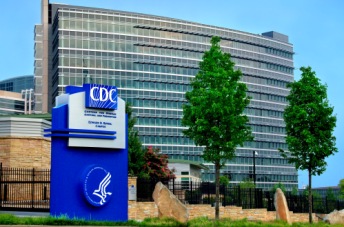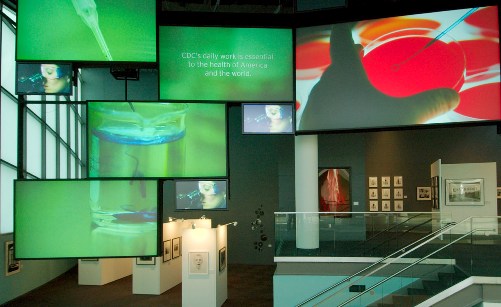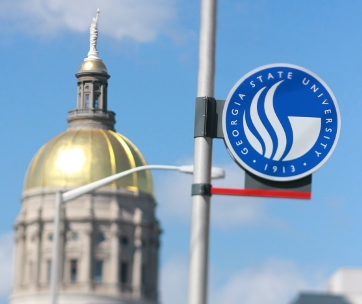Center for Law, Health & Society | News and Events | Center News | 2012 Archive | Finding a Job at CDC Finding a Job at CDC
Finding a Job at CDC
The graduates stressed the difficulty of "getting in" at CDC. "Anyone at CDC can attest to the difficulty in getting a federal job," said Lindsay Culp, JD '10. "I had worked at CDC for several years as an intern, fellow, and contractor before law school, and I knew I needed to have a doctorate degree to be a more competitive candidate."
 Getting a law degree will not guarantee a job, but it can help. Several attorney friends had suggested that Culp go to law school at GSU rather than pursue a PhD. While in law school, she started working at the Public Health Law Program as a fellow and was hired as a federal employee shortly after that. "It is difficult to break into CDC without a demonstrated interest in public health, so students should consider pursuing an MPH degree or at least taking classes in public health," she advised.
Getting a law degree will not guarantee a job, but it can help. Several attorney friends had suggested that Culp go to law school at GSU rather than pursue a PhD. While in law school, she started working at the Public Health Law Program as a fellow and was hired as a federal employee shortly after that. "It is difficult to break into CDC without a demonstrated interest in public health, so students should consider pursuing an MPH degree or at least taking classes in public health," she advised.
It also helps to network and to keep trying. While in law school and even though she did not have a a public health background, Meredith Carr, JD '10, applied for an ORISE fellowship that she heard about through a friend who was employed at the CDC. "Networking is very important if you want to get on board at CDC - talk to your friends and keep your name in the loop," she advised. "In time, your persistence will pay off."
Although he had worked as a consultant for Ernst & Young immediately after law school, Mark Kashdan, JD '99, decided after a year to practice law. "I thought the CDC's legal office would be a great place to put my JD and MPH to work and start my legal career," he said. "I had interviewed for the position right after law school and finished runner-up, but I stayed in touch and the timing was right the second time around."
"Many positions at CDC do not require a JD," said Stacie Kershner, JD '08. "However, candidates with legal degrees are often sought by hiring managers." She also encouraged interested students to obtain a Master's degree in Public Health. "Not having this degree makes it much more difficult to get a job at the CDC and restricts the types of positions available."
Some of the law graduates worked at CDC before law school and characterized their law degrees as another step in an already established career. "Although my career path at CDC did not change with my JD," said Sal Lucido, JD '04, "I think the law degree provides me with an additional level of credibility in the performance of my job."
"I already had a job at CDC when I graduated from law school," said Sherry Everett Jones, JD '03, "but as a result of my legal training, part of my official duties began to include law-related work." Jones' current work relates to surveillance of youth risk behaviors and school health policies, the influence of the built environment on the public's health, and the intersection of law and public health particularly in the context of schools.
Many of the graduates participated in a fellowship program at some point during their CDC careers. "The CDC has several outstanding fellowship programs that can lead to a career in public health or other federal service," said Rebecca Polinsky, JD '07.
Benefits of CDC Employment
The graduates expressed pride in promoting the CDC's mission and satisfaction with its healthy working environment. "I love being part of the mission to better public health," said Gail Horlick, JD '90. Meredith Carr, JD '10, echoed the sentiment: "I love the fact that my work is going towards achieving a bigger purpose - it's all about forming policies that will decrease the new incidence of HIV infection and increase the public's health in general."
 Graduates also emphasized the pride they have in working at CDC. "The best aspect of working at CDC is the reputation we have as a strong, science-based organization," said Sal Lucido, JD '04. "I find most people appreciative of the work CDC does, and that makes going to work every day rewarding."
Graduates also emphasized the pride they have in working at CDC. "The best aspect of working at CDC is the reputation we have as a strong, science-based organization," said Sal Lucido, JD '04. "I find most people appreciative of the work CDC does, and that makes going to work every day rewarding."
Opportunities for interdisciplinary work are recognized as a stimulating component of work at CDC. "I particularly enjoy bring people from various disciplines together and helping them gain a better understanding of each other," said Rebecca Polinsky, JD '07.
The graduates' respect for their colleagues' expertise and hard work is also apparent. "The people at CDC are incredibly talented," observed Harriet Jett, JD '99, "and this motivates me to find opportunities and solutions for better business."
"What I like most about working at the CDC is the dedication of its employees to have a positive impact on the nation's health," said Donald Benken, JD '97. "Every day, scientists, physicians, professional staff, and support staff contribute to an overall mission that results in making a difference in the health of people around the world."
Graduates also appreciated the healthy working environment that CDC provides. "We work very hard, but we're encouraged to have a good work-life balance, and there are no billable hours," said Lindsay Culp, JD '10. "Everyone here works hard and does a good job," said Carr, adding that "the stress level is much less than it would be in a big law firm."
Law School's Impact on CDC Career
Many of the graduates attributed getting their jobs at CDC to their Georgia State law school experience. "I am certain that my law degree was a consideration when I was initially hired," said Gail Horlick, JD '90, who had worked at CDC as a contractor before becoming a federal employee. "Law school taught me to be a critical thinker, a skill I frequently use to analyze policies or the potential impact of legislation."
 Having a law degree has helped to advance graduates' careers within CDC. "The skills developed at the GSU College of Law opened a multitude of doors within the agency that have propelled me to several leadership positions over time," said Donald Benken, JD '97. "I've head offers that would have never become reality without my law school experience." According to him, the most effective skills for working in the policy arena are those he went to law school to develop, including the ability to think more rationally, understand multiple perspectives, and engage in problem-solving.
Having a law degree has helped to advance graduates' careers within CDC. "The skills developed at the GSU College of Law opened a multitude of doors within the agency that have propelled me to several leadership positions over time," said Donald Benken, JD '97. "I've head offers that would have never become reality without my law school experience." According to him, the most effective skills for working in the policy arena are those he went to law school to develop, including the ability to think more rationally, understand multiple perspectives, and engage in problem-solving.
The law degree can also signal professional competence. "In a science-based agency like CDC, credentials are very important," said Sal Lucico, JD '04, "and the JD certainly lends credibility to my position as a policy expert at the agency."
The graduates credited their Georgia State legal education for providing useful skills and knowledge for whatever their jobs are. "My experiences in law school served me very well because there was a strong emphasis on acquiring and using practical knowledge," said Sudevi Ghosh, JD '98. Horlick added, "I learned how to define issues and to communicate complex legal concepts clearly and concisely."
Some graduates emphasized that they had honed skills through their legal education, and others fou
nd their knowledge background enhanced by their law school courses. "I think the College of Law did an excellent job," Lucido said. "The experiences I had at the College of Law bolstered my analytical and communication skills. Siobhan Gilchrist, JD '06, added that "the academic training I received at GSU - particularly in administrative law, local government law, legislation, torts, and constitutional law - is highly relevant to the work I do."
Fellowship Opportunities
Fellowship opportunities can be good options for new law graduates seeking to join CDC. As graduates emphasized, it can be difficult to get your foot in the door at CDC. Although fellowship opportunities are temporary and highly competitive, they provide an opportunity to gain valuable experiences and exposure in the field.
Some of the fellowship opportunities available to lawyers include:
- Oak Ridge Institute for Science and Education Fellowship (ORISE): This fellowship program focuses on conducting research and developing solutions to CDC's critical missions. Current students and recent graduates from a number of graduate fields may apply. Fellows get a monthly stipend based on degree level, experience, and discipline. For more information, visit http://www.orau.gov/cdc/default.htm
- Presidential Management Fellowship: This competitive leadership development program aims to recruit and train future government leaders. Applicants may include recent graduates of advanced degree programs in any discipline. Fellows receive full salary and benefits and possible student loan repayment. For more information, visit http://www.pmf.gov.
Other fellowship opportunities arise as funding and hiring practices allow. These positions are not always posted on the government employee website, USAJobs, so creating and maintaining relationships with CDC contacts can be critical to hearing about them.
Harriet Jett, JD '99, advises students looking for a career in public health to check out special program opportunities at least a year in advance and to not miss deadlines. "Keep in mind a Presidential Management Fellowship may not be right for you if you want a more traditional practice," she noted, and added: "People serve in public health and service to make a difference, and most are not as focused on starting salaries but in gaining an opportunity."